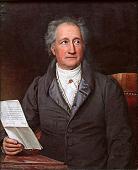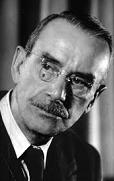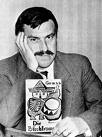

TLW's German Novelist Historyscope |
By T.L. Winslow (TLW), the Historyscoper™ |
© Copyright by T.L. Winslow. All Rights Reserved. |
Original Pub. Date: Aug. 13, 2015. Last Update: Aug. 21, 2015. |





Westerners are not only known as history ignoramuses, but double dumbass history ignoramuses when it comes to German novelist history. Since I'm the one-and-only Historyscoper (tm), let me quickly bring you up to speed before you dive into my Master Historyscope.

In 1774 Frankfurt-am-Main-born world's greatest genius Johann Wolfgang von Goethe (1749-1832) pub. his first novel The Sorrows of Young Werther (Die Leiden des Jungen Werthers) (rev. ed. pub. in 1787), written after being jilted by Charlotte Buff, who marries his friend; Werther ends his sorrows by committing suicide (because he isn't a literary giant who can get off by writing?); the first important excessively sentimental Sturm und Drang novel. In 1795-6 he pub. Wilhelm Meister's Apprenticeship (Wilhelm Meisters Lehrjahre), a Bildungsroman (educational novel) which becomes the model for German fiction for 30 years; Wilhelm attempts to escape bourgeous life, tries the theater, then joins the mysterious Tower Society.

In 1893 Lubeck-born Paul Thomas Mann (1875-1955) pub. his first novel Vision. In Oct. 1901 he pub. Buddenbrooks (2 vols.) (2nd. ed. 1901), which is a big hit, leading to his 1929 Nobel Lit. Prize; a realist novel in the tradition of Stendhal's "Le Rouge et la Noir", following the decline of a wealthy North German Hanseatic merchant family in 1835-77, based on the history of his own family; brothers Johann and Gotthold and the conflict of an artist with a middle class environment. In 1912 he pub. Death in Venice (Der Tod in Venedig); famous author Gustav von Aschenbach gets writer's block and visits Venice, becoming obsessed with a boy (Tadzio), until both are taken by the cholera plague; "Yes, this was Venice... half fairy-tale, half snare." In Nov. 1924 he pub. The Magic Mountain (Der Zauberberg); written in Munich; about the "unremarkable" Hans Castorp, who lives in a TB sanitarium in the Alps before the Great War, which turns into microanalysis of Euro civilization; one of the Big Three Novels of the 20th cent., along with James Joyce's "Ulysses" (1922) and Marcel Proust's "Remembrance of Things Past" (1913-27); Joyce is a sculptor, Proust is a painter, and Mann is an architect?
On Aug. 4, 1914 - Nov. 11, 1918 the horrific World War I causes 15M deaths and 39M military casualties, and destroys the Old Order of white formerly Christian Europe.

In 1922 after traveling to India in 1911 to study their mysticism, Calw, Wurttemberg, Germany-born Hermann Karl Hesse (1871-1962) pub. the novel Siddhartha, about the search for you-taught-it-to-me-too spiritual happiness by Siddhartha (Sansk. "siddha" + "artha" = achieved meaning) and his friend Govinda during the time of Siddhartha Gautama, Prince of Kapilavastu (the Buddha); "Knowledge can be communicated, but not wisdom. One can find it, live it, do wonders through it, but one cannot communicate and teach it." In 1927 he pub. the novel Der Steppenwolf AKA "Henry Haller's Records (For Madmen Only"; written after a brief marriage to singer Ruth Wenger in 1924; psychotic Henry Haller, Hermine, Maria, and saxophonist Pablo of the Magic Theater in a spiritually-barren modern world; dissed by critics for depictions of sex and drug use; in 1928 Hesse pub. the short story "Harry the Steppenwolf" about a wolf kept in a zoo who entertains crowds by destroying images of cultural icons incl. Goethe and Mozart. In 1943 he pub. the novel Das Glasperlenspiel (The Glass Bead Game, Magister Ludi), about the disciplined intellectual world of Castalia in C Europe in the 25th cent., where people play the mysterious Glass Bead Game in the Waldzell School; "Here and there in the ancient literatures we encounter legends of wise and mysterious games that were conceived and played by scholars, monks, or the courtiers of cultured princes. These might take the form of chess games in which the pieces and squares had secret meanings" - I can't comment because of a gag order? He receives the 1946 Nobel Lit. Prize.

In 1927 Glogau, Prussian Silesia-born Jewish Communist Zionist novelist Arnold Zweig (1887-1968) (a fan of Sigmund Freud and a hater of Nazism) pub. The Case of Sergeant Grischa, pt. 1 of 6 of "The Great War of the White Men" (1927-57), a pacifist novel about WWI, making him an internat. star.



On Sept. 1, 1939 - Sept. 2, 1945 the horrific $3.5T World War II resulted in 24M military and 49M civilian deaths, and featured the low point of the Jewish Holocaust (Shoah) by the German Nazis, I guess it was the Jews' fault for not ransoming themselves to go to Israel before they could round them up for the camps. The whole experience turned Jews from lovers into fighters, ramping up the Zionist movement with full world sympathy and support by new world superpower U.S., which had its own guilt trip because on Nov. 24, 1942 Budapest-born Am. Zionist leader Rabbi Stephen Samuel Wise (1874-1949) announced in a press conference in Washington, D.C. that he was authorized by the U.S. State Dept. to confirm that the Nazis had murdered 2M Jews as part of a plan to exterminate all Jews in Europe; too bad, the nat. newspapers didn't consider it front page news, and the U.S. govt. did nada. After the war ended and Americans toured the concentration camps in horror, Polish-born Jewish scholar Raphael Lemkin (1900-59), who single-handedly led an unsuccessful campaign to get the League of Nations to give internat. protections against genocide starting in 1933 finally got what he wanted after his own people got it, namely the Dec. 9, 1948 U.N. Convention on the Prevention and Punishment of the Crime of Genocide (Gen. Assembly Resolution 260), which didn't come in force until Jan. 12, 1951, and which the U.S. still didn't ratify until 1988.

In 1949 Cologne-born Heinrich Theodor Boll (Böll) (1917-85) pub. his first novel The Train Was on Time (Der Zug War Punktlich), Trummerliterature (lit. of the rubble) about German soldier Andreas, who takes a train from Paris to the front in Przemysl, Poland, learning about the horrors German soldiers endure, hooking up with Polish ho Olina and planning their escape to the Carpathian Mts. In 1953 he pub. And Never Said a Word (Und sagte kein einziges Wort), about married couple Fred and Kate Bogner, who split during WWII and meet only in hotel rooms when they can afford it. In 1955 he pub. The Bread of Those Early Years (Das Brot der Fruhen Jahre); filmed in 1962. In 1959 he pub. Billiards at Half-Past Nine (Billard um Halbzehn); the Faehmel family from the end of the 19th cent. until Sept. 6, 1958. In 1963 he pub. The Clowns (Opinions of the Clowns) (Ansichten Eines Clowns), about Bonn-based traveling clown Hans Schnier, who can smell through the telephone and loses his babe Marie to another man. In 1971 he pub. Group Portrait with Lady (Gruppenbild mit Dame); Leni Guyten (1922-) tells the stories of her friends, lovers, and enemies in a small town in W Germany during the Nazi era; filmed in 1977. In 1974 he pub. The Lost Honor of Katharina Blum: Or, How Violence Develops and Where It Can Lead (Die verlorene Ehre der Katharina Blum oder: Wie Gewalt entstehen und wohin sie führen kann), about a housekeeper who is hounded by a tabloid reporter and the police, who are investigating her lover, who robbed a bank (for the Red Army?). In 1979 he pub. The Safety Net (Fursorgliche Belagerung); English trans. pub. in 1981; aging art historian turned newspaper publisher Fritz Tolm is elected head of the Association, a secret "power center" in Germany. He receives the 1972 Nobel Lit. Prize.

In 1959 Danzig-born Gunter (Günter) Wilhelm Grass (1927-) pub. his first novel The Tin Drum (Die Blechtrommel), about Danzig mental asylum inmate narrator Oskar Matzerath (1924-), who willed himself to stop growing at age 3 and revisits the uncomfortable Nazi past, showing how the little people helped the Holocaust; #1 in the Danzig Trilogy ("Cat and Mouse", "Dog Years"). He receives the 1999 Nobel Lit. Prize.